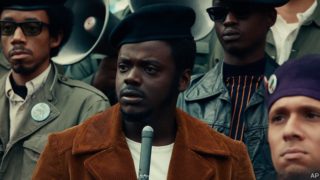Three exceptional lead performances bolster Shaka King’s film
HUEY NEWTON and Bobby Seale founded the Black Panther Party (BPP) in Oakland, California, in 1966. The BPP was anti-capitalist and revolutionary; its most visible activities were armed patrols in African-American neighbourhoods to protect citizens from what the BPP (among others) viewed as persistent police brutality, and a free breakfast and education programme for children in those neighbourhoods. Within a couple of years, the BPP had chapters across America, as many younger African-Americans grew frustrated with mainstream civil-rights groups such as the NAACP. J. Edgar Hoover, the longtime head of the FBI, viewed the BPP as a threat, and used illegal, covert tactics known as COINTELPRO (short for “counter-intelligence programmes”) to weaken the party and sow division in its ranks.
“Judas and the Black Messiah” tells the story of one COINTELPRO target: Fred Hampton, the 21-year-old deputy chairman of the Illinois BPP chapter, played by Daniel Kaluuya, a British actor (pictured). Hampton died in a pre-dawn police raid. Deborah Johnson, his fiancée, who was with him at the time, has long insisted that he was assassinated—a view that many have come to share. It gives little away to say that this film agrees. Hampton was a charismatic, effective leader and organiser: the film shows him leading an unlikely coalition of Panthers, Latino gang members and poor whites against police brutality. Hampton is the Black Messiah of the film’s title.
Judas is William O’Neal, played by LaKeith Stanfield. He was a petty criminal nabbed for car theft and impersonating a federal officer; to avoid a long prison sentence he agrees to befriend Hampton and inform on him to the FBI. His task endangers his physical safety—around halfway through the film, a Panther from New Haven tells O’Neal that his chapter tortured and murdered someone they suspected was a police informant. But the greater challenge is moral and emotional. The closer O’Neal grows to Hampton, the more he comes to like the deputy chairman, and to respect his work. But the closer he gets, the better and more detailed the information he provides the FBI, and the more harm it does to Hampton.
The film will inevitably draw comparisons to “The Departed”, Martin Scorsese’s movie about a double-double cross (an undercover cop embedded in a criminal gang, with a gang member embedded in the police, each chasing the other). But Shaka King’s direction is much steadier and less self-indulgent and, thematically, the parallel does not quite hold. In this film, both sides are not corrupt, only the law is.
Hoover—cartoonishly portrayed by Martin Sheen under so much putty and makeup that he does not resemble Hoover so much as a malevolent, Hoover-sized Muppet—revels in the deception and murder of African-Americans guilty of nothing more than propounding political views he dislikes. As Roy Mitchell, the FBI agent who runs O’Neal, Jesse Plemons is oleaginous and condescending as he tries to convince his charge (and perhaps also himself) that “the Panthers and the Klan are one and the same”.
The film succeeds largely because of the three exceptional performances at its centre. As she did in “Show Me a Hero” and “The Deuce”, two HBO series, Dominique Fishback, who plays Ms Johnson (today known as Akua Njeri), perfectly balances strength and vulnerability. As the police murder Hampton in his bed, the camera stays close on her face, which is at once affectless and sorrowful, determined and frightened—all emotions that she conveys entirely with minute, shifting expressions around her eyes.
Mr Kaluuya electrifies as Hampton. In “Get Out” Mr Kaluuya’s dorky affability sharpened into grim determination over the course of the film, and in “Widows”, his economy of movement and menacing stare made him a perfect enforcer. This film gives him more range. He holds a room in thrall as a rabble-rousing speaker (even as his American accent occasionally slips) while also displaying quiet warmth in more intimate scenes. A possible quibble with his performance, as with Mr Stanfield’s, is that they are perhaps too assured and mature. Both actors are around 30 years old. Hampton was just 21 when he was killed, and O’Neal just 17 when the FBI grabbed him.
Still, Mr Stanfield complements Mr Kaluuya’s performance perfectly. Over the past few years—with particularly notable performances in “Sorry to Bother You”, a satire that flags whenever he is off-screen, and “Atlanta”, in which he plays the series’s funniest character just a bit more weirdly and soulfully than pure comic relief—Mr Stanfield has become one of the most beguiling presences in American cinema, able to improve any movie or show in which he appears. This film succeeds partly because he and Mr Kaluuya are such stylistic opposites. Mr Stanfield’s hesitant, watchful manner and anxious expression suggest that he is holding something of himself back, while Mr Kaluuya’s focused vibrancy suggests precisely the opposite.
As O’Neal, Mr Stanfield is twitchy, uncertain and never quite comfortable in his own skin. The film takes a hagiographic view of Hampton, but Mr Stanfield portrays O’Neal not as a villain but as a tragic figure, which he was. O’Neal himself gave just one televised interview, to a public-television series about the civil-rights movement. On the night it aired, he ran into traffic on an expressway in Chicago and killed himself. Conscience costs.
“Judas and the Black Messiah” is playing in select cinemas and streaming on HBO Max now
By J.E.F./The Economist





